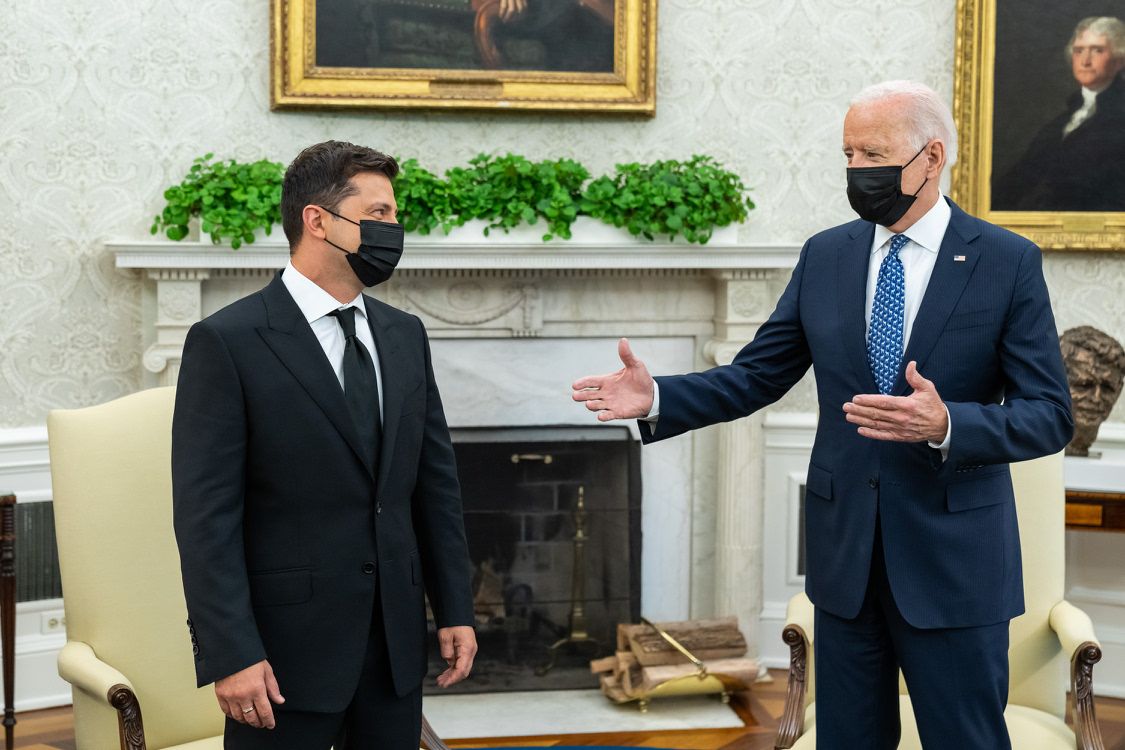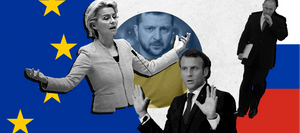The Briefing: Ukraine applies to join the European Union.
- Special circumstances, special treatment
- In February, Ukraine filed an application to join the EU
- They're required to meet key EU standards and receive unanimous approval from existing members
- Usually this process would take years, even decades
- But in recent days, Ursula von der Leyen, the President of the European Commission, promised an accelerated evaluation of Ukraine's candidacy
- What leaders are saying
- EU heads of state declared that "we will further strengthen our bonds and deepen our partnership to support Ukraine in pursuing its European path. Ukraine belongs to our European family."
- But Dutch Prime Minister Mark Rutte has said "there is no fast track procedure to become a member of the EU"
- French President Emmanuel Macron made a similar comment, saying that the EU "must be vigilant" and that it would be unwise to "open an accession procedure with a country at war"
- There are challenges
- Some post-communist member states have struggled to meet the EU's standards for democracy and rule of law
- Hungary, Poland, Romania, and Bulgaria have all struggled to develop flourishing markets, consolidate democratic political institutions, and crack down on corruption
The Big Question: Would Ukraine be a problematic EU member?
The Ukrainian desire for European integration, while it has taken on a unique urgency thanks to Russia’s invasion, is nothing new or surprising. Back in 2014, just before the Russian annexation of Crimea, Ukrainians took to the streets for months to oust the Russian-aligned President Viktor Yanukovych, who rejected a popular free trade agreement with the EU. Then, as now, alignment with the EU seemed to promise opportunity, security, and prosperity for many Ukrainians.
But before and after 2014, Ukraine has been a major economic and democratic laggard in Europe. Its political institutions are heavily influenced by wealthy oligarchs and it suffers from significant corruption problems. Its GDP per capita may be Europe’s lowest. And while Ukraine ultimately ratified the EU trade agreement, it’s significantly behind in making the political and economic reforms needed to get anywhere close to EU accession.
Of course, were the EU to admit Ukraine it would not be the first time that the bloc has opened its arms to countries that were unable to meet its high standards on democracy, markets, and the rule of law. And it’s certainly the case that countries like Bulgaria and Romania, which still do not meet the EU’s standards on corruption, have been able to make improvements to the quality of their democracies thanks to their accession to the EU.
As Ukrainian popular agitation suggests and the experience of many post-Soviet states confirms, membership in the EU can be a huge boon to countries comparatively behind Europe’s wealthiest nations. However, it’s not clear how much—if at all—the EU benefits from the admission of these countries. Hungary and Poland tell a particularly cautionary tale about how countries can gain huge economic benefits from membership while severely undermining the cohesion and stability of the Union through domestic rollback of democratic institutions.
With that context in mind, it’s important to ask where Ukraine fits in all of this. Would it contribute to the EU, or be a drag?
The Theory: Two Visions for Europe.
To ask this question—where and whether Ukraine fits in liberal democratic Europe—is to ask an existential question of the EU itself. European leaders have, throughout the organization’s decades of history, been unable to reach a meaningful consensus as to what the EU should be.
In particular, two of the EU’s most powerful nations, Germany and France, have long offered competing visions. The mid-century French statesman Charles de Gaulle preferred a tighter and more cohesive bloc with a shared identity, and objected to admitting the United Kingdom to the European Economic Community (which preceded the EU) on the grounds that it would fray that identity. Today, French President Emmanuel Macron has expressed a similar desire for deeper political integration and a reluctance to add new member states.
Conversely, Germany, under former Chancellor Angela Merkel, has resisted deepening the EU’s ties, instead preferring to widen the bloc as a commercial entity with less attention to shared political identities and democratic norms. Deeper integration, this side would argue, risks turning the EU into an exclusive clique of wealthy and successful liberal democracies, to the economic disadvantage of the Union’s neighbors. It’s unsurprising then that Von der Leyen, Merkel’s longest-serving cabinet minister and close political ally, has taken a similar tack by extending Ukraine this invitation.
For those who think like Macron, shared commitment to democracy is the EU’s binding glue. Admitting states that are only partial democracies or half-heartedly committed to the EU’s ideals and shouldering the responsibility of coaxing their democratic transition along could undermine the EU’s cohesion and efficacy.
The Takeaway: “No easy answer” is a better answer.
There’s no simple answer to this question of EU identity, more broadly. On the one hand, admission of countries like Poland and Hungary, perhaps even Bulgaria and Romania, have strained the democratic fabric of the Union. On the other hand, there’s no telling how many democracies have been strengthened and improved by European integration. Regardless, if the EU wants to continue to bolster European peace and democracy, it will have to come to grips with this question in a serious and forthright manner.
Fast-tracking Ukraine’s application, therefore, is a definite step in the wrong direction. Rushing to add a new member—one that is only partially democratic and in the midst of an existential conflict—is an attempt to answer the question too quickly.
Indeed, one wonders just how much EU leaders like von der Leyen have really thought through their outstretched hand to Ukraine. The country is nowhere near meeting the Union’s standards on democracy and rule of law. Individual member states like France and the Netherlands are hardly likely to contribute to a unanimous decision to bring Ukraine into the fold.
What this suggests is that there’s a lot of posturing going on, that despite the smiles and reassurances any process of accession is far from certain. It would be better for European leaders, even as they continue—as they should—to support Ukraine in its resistance against Russian aggression, to be frank about that fact. If anything, the drama over Ukraine’s application to the European Union is a sign that dialogue about the Union’s future is more important than ever, and that that dialogue needs to take place before rash actions or statements.
Subscribe to Spectacles



Comments
Join the conversation